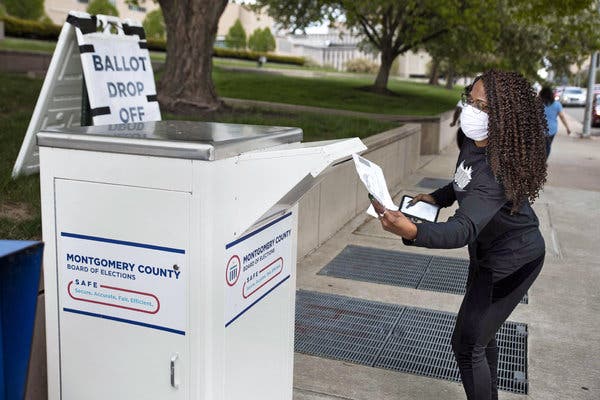Advertisement
Poll Watch
After several near misses, Democrats can taste victory in Georgia — and Republicans fear President Trump’s lackluster numbers may drag down the party’s Senate candidates with him.

When President Trump travels to Macon, Ga., tonight for a campaign rally, Republicans will be looking for him to keep more than his own electoral fortunes alive.
There is perhaps no other state in which Mr. Trump’s recent slide in the polls has the potential to do as much collateral damage. In addition to staring down what could be their first presidential defeat in Georgia since 1992, Republicans stand to lose not one but two Senate seats if things don’t break their way. In both Senate races, the Trump-aligned Republican candidates have slipped in recent polls.
Those immediate vulnerabilities are colliding with a slow burn of demographic change that has thrown this once firmly Republican state into play. White residents now make up fewer than three in five voters in Georgia, and a wave of migration to the Atlanta area over the past decade has added roughly three quarters of a million people to the state’s major Democratic stronghold.
Which helps explain why this week Joseph R. Biden Jr. was able to nose out ahead of Mr. Trump in a range of polling averages. Surging alongside him are Jon Ossoff and the Rev. Dr. Raphael Warnock, the Democratic candidates vying for the state’s two open Senate seats.
“One of the things I’m looking at is what we call the 30-30 rule,” said Trey Hood, a political scientist at the University of Georgia who directs its Survey Research Center. “Can a Democratic candidate get 30 percent of the white vote statewide, and do African-Americans constitute 30 percent of the electorate over all? If you can get to those levels as a Democrat, you’ve got a pretty good shot at winning.”
In 2016, Hillary Clinton came within five points of Mr. Trump in Georgia while winning only 21 percent of white voters, according to exit polls. But polling suggests Mr. Biden is likely to land closer to 30 percent among white voters.
The story doesn’t just play out along racial lines. Georgia’s electorate is growing younger, with 50 percent of its voting-eligible population now under the age of 45, according to the Census Bureau — ahead of the national average. And across racial lines, those younger voters trend more liberal, a fact that threatens to further shake up the longstanding electoral calculus.
In a recent University of Georgia/Atlanta Journal-Constitution poll, 64 percent of voters under 30 supported Mr. Biden, not far off from his numbers nationally.
And of the more than 300,000 new voters who registered in Georgia last year, a large majority were either nonwhite or below age 30.
Since the presidential debate on Sept. 29, high-quality polls have shown a range of outcomes in Georgia — from a slight Trump edge last week in the University of Georgia/Atlanta Journal-Constitution poll to a clear, seven-point Biden lead in a Quinnipiac University survey released on Wednesday. But over all, they have found Mr. Trump failing to match the strength of his 2016 support, particularly among white college graduates and older voters.
The effects are spilling over into the state’s two Senate races. In one, Mr. Ossoff, who narrowly lost a 2017 special election for a House seat in the Atlanta suburbs, is challenging Senator David Perdue. Mr. Ossoff led by six points in the Quinnipiac survey, although other recent polls, including the University of Georgia survey, have shown Mr. Perdue holding a sizable lead.
In the other, a wide-open race to fill the seat vacated by former Senator Johnny Isakson, it is a Democrat, Dr. Warnock, who consistently garners the most support in polls, although he is facing two powerful Republican candidates whose combined share generally exceeds his. If no candidate wins 50 percent of the vote in either Senate election — as appears particularly likely in the race for Mr. Isakson’s old seat — a runoff would be held in early January.
Like Mr. Perdue, both of the leading Republicans in the special election — Senator Kelly Loeffler, who was appointed to fill Mr. Isakson’s seat on an interim basis, and Representative Doug Collins — have hitched themselves firmly to Mr. Trump’s coattails, a gambit that has begun to look perilous as his favorability rating has dipped in a range of Georgia polls.
It’s possible Dr. Warnock could suffer the same fate that Mr. Ossoff did in the Sixth District election three years ago — nearly winning it outright, before suffering a narrow loss to a Republican in the runoff.


